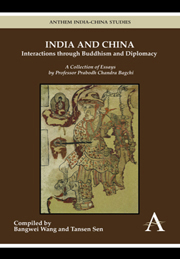 India and China: Interactions through Buddhism and Diplomacy
India and China: Interactions through Buddhism and Diplomacy from Part One
Published online by Cambridge University Press: 05 March 2012
India is at present known in China under the name Yin-tu. This is not a modern adaptation. It goes back at least to the T'ang period. It seems to have been current slightly earlier, but the great Chinese pilgrim Hsüan-chuang was the first to baptise it. In his Hsi-yü Chi, while discussing the various Chinese names for India, he says:
“We find that different counsels have confused the designations of Tienchu (India); the old names were Shen-tu and Sien (or Hien)-tou; now we must conform to the correct pronunciation and call it Yin-tu. The people of Yin-tu use local appellations for their respective countries; the various districts having different customs; adopting a general designation and one which the people like, we call the country Yin-tu which means the Moon”.
It is clear from the statement that the Indians themselves had no popular general designation for the country as a whole and Yin-tu was a name used by the Chinese for the country. Hsüan-chuang as a great Sanskritist was keen on explaining the etymology of the names and hence explained the name Yin-tu (ien-duo>indu) as “moon”. In fact, as a Sanskrit word it (indu) can mean only “moon”. Hsüan-chuang also justified his explanation in an ingenious way:
“The unceasing revolutions of mortals' existence are a dark long night; were there not a warden of the dawn they would be like the night with its lights which succeeds the setting of the sun; although the night has the light of the stars, that is not to be compared to the light of the clear moon. […]
To save this book to your Kindle, first ensure no-reply@cambridge.org is added to your Approved Personal Document E-mail List under your Personal Document Settings on the Manage Your Content and Devices page of your Amazon account. Then enter the ‘name’ part of your Kindle email address below. Find out more about saving to your Kindle.
Note you can select to save to either the @free.kindle.com or @kindle.com variations. ‘@free.kindle.com’ emails are free but can only be saved to your device when it is connected to wi-fi. ‘@kindle.com’ emails can be delivered even when you are not connected to wi-fi, but note that service fees apply.
Find out more about the Kindle Personal Document Service.
To save content items to your account, please confirm that you agree to abide by our usage policies. If this is the first time you use this feature, you will be asked to authorise Cambridge Core to connect with your account. Find out more about saving content to Dropbox.
To save content items to your account, please confirm that you agree to abide by our usage policies. If this is the first time you use this feature, you will be asked to authorise Cambridge Core to connect with your account. Find out more about saving content to Google Drive.